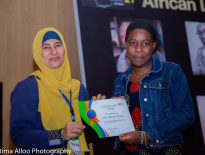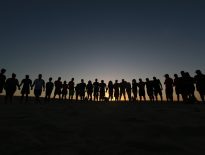The tomorrow of Nigeria is dicey not only because her policymakers are a bunch of irredeemable selfish individuals, but because her masses are too docile to call the leaders to order. The assurance of a better tomorrow for the country is so uncertain since her teachers and the whole of her education sector are run by self-centred persons.
It does not require the power of clairvoyance to know that education and the whole gamut of what it means in Nigeria is fast sliding down the precipice. Only those who are in doubt of the invaluable roles of education as not only a means of human capacity development but also as an agent of moral reformation for the individual and society at large will argue on the contrary.
Unfortunately, gone are the days when education was a panacea to the country’s growth and development; when the Nigerian youth chased after education as not only a means to an end but the very end itself. Then, quality education was given without compromise. Of course, those who were able to acquire education then have stories of personal victories to share; even if the only gain for Nigeria was the false hope of a better tomorrow expected to culminate from the individual successes of her citizens. Ironically, the tomorrow of yesterday is the today that is no longer a dream. Nonetheless, even if our yesterday’s dreams of tomorrow turned out to be nothing but pure fantasy, something that existed in the delusion of imagination, it was unlike the reality of our today’s dreams of tomorrow, where there is no cliffhanger or iota of hope for something better. So now the story of education in Nigeria is neither in favor of the individuals in the country nor the entire nation.
Read – The Tomorrow People – An Article by Chris Baah, Ghana
The cause of the interregnum in the upward story of education in Nigeria in the 70s and the early 80s is that successive governments of the country thereafter took little or no interest in education and the private entrepreneurs that eventually came in to fill the gaps ended up filling their stomachs. They could not for once pretend to be Mother Theresa.
The unfortunate reality about education is that it is too important to nation-building to be left in the hands of avaricious interests. When this becomes the case, as it is presently with Nigeria, what will happen is that education will not only be taken away from the reach of the populace, it will become so expensive that the few that can afford it will only be paying for a sordid service as against quality education. This of course is adversarial to what was obtained in the western part of the country in the 1970s when Chief Obafemi Awolowo, as the premier of this region, introduced his populist and egalitarian policy of free education that not only bought freedom for many families from poverty but whole-heartedly welcomed the Western region into the committee of enlightened people.
Education in Nigeria today is however in a sorry state where the products from our various institutions are known to be either unemployable or are underemployed. The country’s youth go to school now out of formality; to be occupied for some time until they are of age and mean enough to veer into some other detrimental means. Sadly, our education will continue on this ugly path unless something encouraging is done quickly to reverse the deplorable conditions of her teachers. It is no longer news that the most unfortunate job to find yourself in Nigeria is the teaching profession. Those in the government’s teaching employments are only an inch better than their peers in the private sector. The summary of the dilemma of private school teachers’ lives is that they are neither respected by their students nor by their capitalistic employers, who will compromise anything but the irrational and insatiable interests of their students and their parents.
Read – Dreams of Tomorrow – An Article by Alliance Ankiambom, Cameroon
Teachers in Nigeria are not only underpaid; most school owners dehumanize their teachers by overlabouring them. Most of these teachers do worse than the babysitters in our private schools today. In this modern-day of occupation diversification, it has become another normal thing to see, for instance, a trained English Language teacher teaching tangential subjects; a teacher that teaches three to four different subjects. Perhaps this is not an occupational hazard, as one of my good friends will always argue that this is a perfect illustration of what is called interdisciplinary studies. After all, the latest workforce vocabulary gets to call it with the euphemism – multi-tasking. Perhaps the height of teachers’ dilemma in Nigeria today is that students now waylay their teachers for parents to barge into schools with thugs to beat teachers on the offence that they dared to correct students.
Why should I think that I am not being a nihilist for thinking that the idea of a better tomorrow in the Nigerian education sector is implausible? I happen to know a maxim that says that the quality of a country’s teachers is the quality of her education. For crying out loud, Nigeria is not Angela Mikel’s Germany where teachers are the highest-paid employees.
There will always be the incurable optimists who will argue that these uncomplimentary views about Nigeria are nothing but opinions of naysayers and alarmists who enjoy blowing issues out of proportion. It is usual for these sets of patriots to push that education in Nigeria is not nosediving, that the statistics of nationwide examinations such as West African Examinations Council (WAEC) and National Examinations Commission (NECO) show that students performances today are far better than what was three decades back. Of course, this is the true report card. The other side of the same statistics that these patriots have always been blinded to is that today’s youth and their proprietors and proprietresses have perfected ways to beat examination bodies to malpractices; that the students’ sterling performances in schools have not always aligned with their capacity developments.
Read – Towards a new Window of Perspectivism – An Article by Nchimunya Michelo, Zambia
I am not too sure that this pathetic situation is not the same in other African countries. I really hope that things will be different from how we were taught in Physical Geography class back in secondary school where for the broadness of the subject, as with this matter of education, we were always taught the Nigeria Physical Geography and told that whatever happens in Nigeria will replicate in other West African countries.
This article was published in the March 2022 edition of the WSA magazine.
Please click here to download the Magazine.
This Magazine is published by a team of professionals and downloadable for free. If you would like to support our work, please buy us coffee – https://www.buymeacoffee.com/wsamagazine







